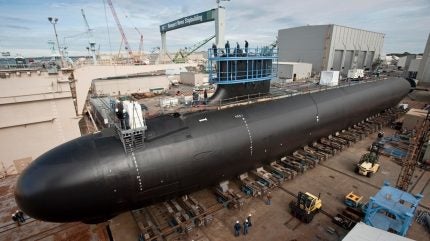
The US Government has announced its strategic investment in maritime manufacturing skills in the state of Michigan, focusing first on submarine construction skillsets, which will then open up to the surface fleet.
This decision will cultivate a submarine industrial base that has strained to meet the US Navy’s strategic ambitions in a new, more contentious, security environment.
Carlos del Toro, the US Secretary of the Navy, announced the Michigan Maritime Manufacturing (M³) initiative at the Macomb Community College, an academic institution committed to developing the future maritime workforce in the region.
More than $50m will be injected into the Michigan naval workforce, a state with a strong veteran population – as many as 500,000 people, according to the state Governor Gretchen Whitmer – and is known for its industrial legacy stretching back to the innovations that Henry Ford introduced.
M³ will establish training pipelines and programmes to meet the Navy’s need for thousands of new workers and jobs across the state and the broader Great Lakes region. A new training curriculum focused on maritime welding and machining with the scale and speed needed to fill manufacturing and engineering gaps in the maritime workforce will be introduced.
The initiative also comes at an opportune time at the height of the presidential election campaign, and after manoeuvring within the Democratic Party left Vice President, Kamala Harris, the frontrunner for the Party nomination.
Michigan is a key swing state, meaning the Republicans and the Democrats have similar levels of support among voters, which will have a detrimental result on the outcome of the November election.
US Maritime Statecraft
The US Navy is pursuing a new Maritime Statecraft, spearheaded by Del Toro, which involves projecting a strong naval and commercial shipping presence on the world stage as a form of “pragmatic diplomacy.”
In his speech, Del Toro referenced the wartime president, Franklin Delano Roosevelt, whose nickname for Michigan was the “arsenal of democracy.” It is hoped the label may be revived as the Navy confronts China in the Indo Pacific, a the theatre currently defined by grey-zone manouevring.
Many elements must come together domestically to feed this bold foreign and defence policy, such as sufficient industrial capacity and a large enough workforce. US naval institutions are making efforts to fill these gaps in the sector.
Overcoming the skills deficit
This includes Bartlett Maritime, a corporation with the expressed purpose of assisting the Navy with the resolution of its submarine shortfall, whose founder and CEO, Edward Bartlett, asserted in autumn 2023 that the crisis had become “an inescapable and urgent problem.”
The corporation is deriving new solutions form other industries. They recently entered a national labour agreement with the International Brotherhood of Boilermakers union at the end of May to provide a rotational workforce of skilled welders in support of Navy shipbuilding and repair projects across the country.
At the time, Bartlett spoke with Naval Technology in an exclusive on the enduring skills deficit and the new agreement.
“This is a different approach in that we’re tapping into another source of skilled trades, in another sector of the industry of the marketplace, and making them available to the Navy,” explained Bartlett.
While this workforce model has already been implemented in other industries, including energy – such as the Dakota oil fields and offshore rigs – this approach has not been applied in the naval shipbuilding and repair sector until now.
“We’ve already been contacted by other unions that see this as a prototype that they’d like to follow. So the most critical skill in shortage for the US Navy is welders. But similar skills in pipe fitting, which is a different unit… they want to get involved. I know that eventually the electricians will be involved, as well as the machinists.”



